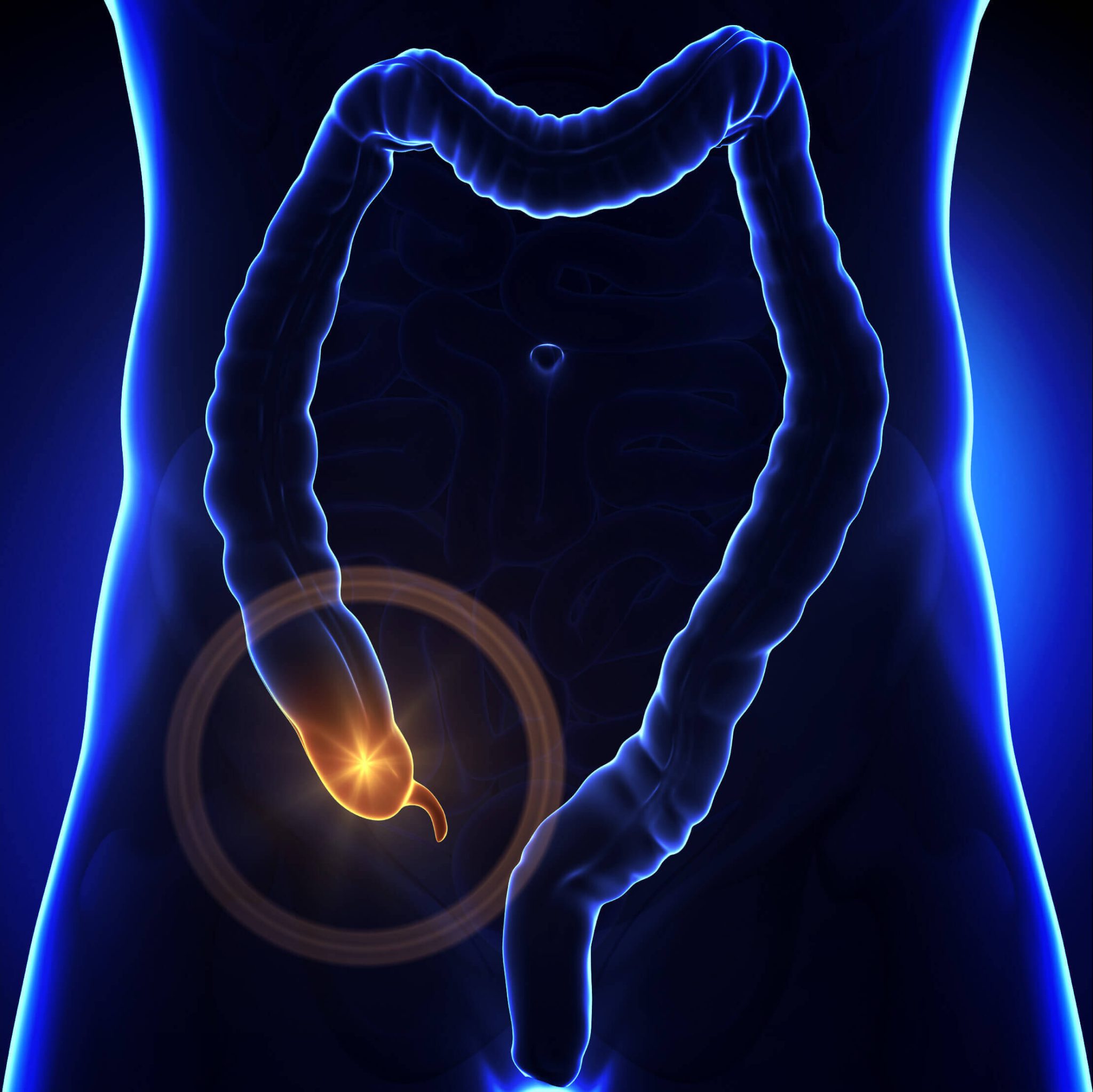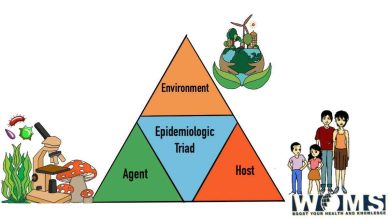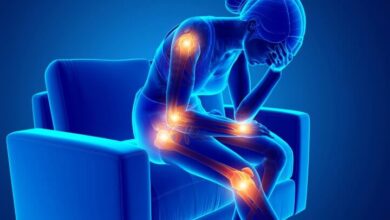How to prevent appendicitis

Appendicitis is defined as the inflammation of the vermiform appendix, a 2-20 cm tube the extend from the caecum of the large intestine. It may be acute or chronic. Appendicitis is caused by the blockage of the hollow portion of the appendix with stone. One of the studies has shown that the appendix may have some role in gut immunity, but nothing is definite. One thing we know that: we can live without it, without apparent consequences.
The blockage of the appendix is due to the calcified “stone” made of feces. Inflamed lymphoid tissue from a viral infection, parasites, gallstone, tumors may also cause the blockage. This blockage leads to increase pressure in the appendix. Decrease the blood flow to the tissue of the appendix, and bacterial growth inside the appendix causing inflammation. The combination of inflammation reduces blood flow to an appendix, and distention of the appendix causes tissue injury and tissue death.
Appendicitis is the medical emergency that almost requires prompt surgery to remove the appendix left untreated, an inflamed appendix will eventually burst, or perforate, spilling infectious material into the abdominal cavity. This can lead to peritonitis, a serious inflammation of the abdominal cavity’s lining (the peritoneum) that can be fatal unless it is treated quickly with strong medications (antibiotics). Sometimes pus-filled with an abscess (an infection that is walled off from the rest of the body) forms outside the inflamed appendix. Scar tissue “walls off” the appendix from the rest of the abdomen, preventing infection. For appendicitis surgery, general anesthesia is given and then the inflamed appendix is removed.
How to prevent appendicitis? It can’t be prevented but there are some ways to lower the risk of appendicitis. Read the full article to know how to lower the risk of appendicitis.
Is it appendicitis or gas?
Indigestion or other gas related (Gastritis) pain are common symptoms of appendicitis. In some cases you may feel as though the gas is trapped and find that you ‘re unable to explain the gas.
If you’re only experiencing mild gas-related discomfort like gastritis, you can take an over-the-counter (OTC) heartburn medication and see if your symptoms fade.
- Popular OTC option includes
- Omeprazole (prilosec)
- Lansoprazole (prevacid)
- Ranitidine (zantac)
If your symptom perched more than a day or causes you unbearable pain or discomfort see your doctor right away. You should also see your doctor if you’re experiencing any unusual symptoms.
Symptoms
The classical symptoms of appendicitis include:
- Dull pain in the peri-umblical or the upper abdomen that becomes sharp as it moves to the lower right abdomen. This is usually the first sign
- Loss of appetite
- Nausea and/or vomiting soon after abdominal pain begins
- Abdominal swelling
- Fever of 99-102 degree Fahrenheit
- Inability to pass gas
Almost half time, other symptoms of appendicitis include:
- Dull or sharp pain anywhere in upper or lower abdomen, back or rectum
- Painful urination and difficulty passing urine
- Vomiting that preceded abdominal pain
- Severe cramp
- Constipation or diarrhea with gas
If you have any of these mentioned symptoms seek the medical attention immediately because timely diagnosis and treatment are very important. Do not eat or drink, or use any pain remedies, antacids, laxatives, or heating pads, which can cause the inflamed appendix to rupture.
Is back pain a symptom of appendicitis?
Appendicitis is primarily associated with stomach pain, but the pain can be also felt in your side or back. Oftentimes, this pain will worsen if you move, walk, run or even cough.
If you are experiencing significant pain that doesn’t fade after 4 hours, you should see your doctor.
Are the symptoms of appendicitis the same in the teens?
Although the symptoms of appendicitis are the same for adolescents as they are for adults, they may begin differently. In adults, appendicitis can begin as a vague stomach near the navel. This pain may progress to the lower side of the abdomen.
After this pain may have appeared, you may:
- Develop a fever
- Lose their appetite
- Feel nauseous
- Vomit
If you experience these symptoms. See your doctor.
Complications
Appendicitis causes serious complications as follows;
A ruptured appendix: A rupture spread infection throughout the abdomen (peritonitis). Possibly life-threatening, this condition required immediate surgery to remove the appendix and clean the cavity.
A pocket of pus that forms in the abdomen: if your appendix bursts, you may develop a pocket of infection (abscess) in most case surgeon drain the abscess by placing a drain tube through your abdominal wall into the abscess. The tube is left in place for two weeks, and you are given an antibiotic to clear the infection.
Once the infection is clear, you will have surgery to remove the appendix. In some cases, the abscess is drained, and the appendix is removed immediately.
How is appendicitis diagnosed?
Symptoms of appendicitis are frequently vaguely or extremely similar to the other aliments, including gall bladder problem, bladder or urinary tract infection, Crohn’s disease, gastritis, intestinal infection and ovary problems.
The following test is usually used to help to make the diagnosis:
- Abdominal examination to detect the inflammation
- A urine test to rule out the urinary tract infection
- Rectal examination
- Blood test to see if your body is fighting with infection
- CT scans/ or ultrasounds
How is appendicitis treated?
Surgery to remove the appendix, which is called an appendectomy, is the standard treatment for all the case for appendicitis.
Generally, if appendicitis is treated the doctor tends to err on the side of safety and quickly remove the appendix to avoid its rupture. If the appendix has formed an abscess, you may have to the procedure; one to drain the abscess of pus and fluid, and later one to remove the appendix. However, some research shows the treatment of appendicitis with antibiotics as a conservative treatment.
What’s the recover time for appendicitis?
If an appendicitis patient undergoes a laparoscopy, you will likely leave the hospital a few days after the operation. This surgery is less invasive, so the recovery time tends to be shorter than open surgery.
If you go for open surgery or experience additional complications, such as peritonitis, you may have to remain at the hospital for up to a week, and a drain may be needed. If your abdominal muscles need to be but during the procedure, your recovery time may be longer.
You may experience tenderness and bruise after your appendectomy operation. This will improve over time and may be relieved by over-the-counter analgesics (pain killers), such as acetaminophen (Tylenol) and ibuprofen (Advil).
You may also experience temporary constipation. Staying hydrated and eating fiber-rich foods may help regulate your bowel movements and keep you comfortable.
Food high in fiber includes:
- Split peas
- Lentils
- Black beans
- Lima beans
- Artichokes
You should able to resume normal activities within a couple of weeks. Your doctor may advise avoiding strenuous activity such as sports, lifting for four to six weeks after surgery.
What about appendicitis in pregnant women?
During pregnancy, acute appendicitis is the most common nonobstetrical requiring surgery. It occurs at the same rate who are pregnant and non-pregnant.
When it does occur in pregnant women, I’m usually during the second or third trimester. Its symptoms can often be mistaken for routine discomfort associated with pregnancy, making the difficulties in diagnosis.
Delayed diagnosis during pregnancy can increase your risk of complications, including fetal loss. Women who are pregnant also have a higher risk of perforation or ruptured appendix.
Treatment for women who are pregnant and have appendicitis is the same as for women who aren’t pregnant.
During recovery, women who are pregnant will be monitored even more closely with their surgeon, primary doctor, and obstetricians.
If laparoscopic surgery is done, the recovery process generally is similar for women who are pregnant and aren’t pregnant.
If laparoscopic surgery is done, the recovery process generally is similar and fast to the women who aren’t pregnant.
If an open surgical procedure is needed, your recovery time may be longer than laparoscopic surgery. This is especially if your abdominal muscles are cut during the procedure or if there’s peritonitis. In some cases, peritonitis may be causing fetal loss.
How to prevent appendicitis?
You can’t prevent appendicitis, but there are steps to take to lower your risk. It is less common in people who have diets high in fibers.
Add fiber by
- Sprinkling oat bran, wheat germ over breakfast, cereals, yogurts and salad
- Cooking or baking with whole-wheat flour whenever possible
- Swapping white rice for brown rice
- Adding kidney bean or other variations to salad
- Eating fresh fruit for desserts
Summary
Appendicitis is common in young males, in white races. How to prevent appendicitis? one of the commonest questions asked by everyone. appendicitis can’t be prevented but its risk can be lower down. Fiber-rich food is used to lower down the risk of appendicitis. less fiber diet increases the chance of appendicitis.
It is common in May and August-seasonal variation-often called epidemic appendicitis. family history may be relevant in 30% of appendicitis in children with appendicitis occurring in first-degree relatives. Hope this article helps you a lot.




